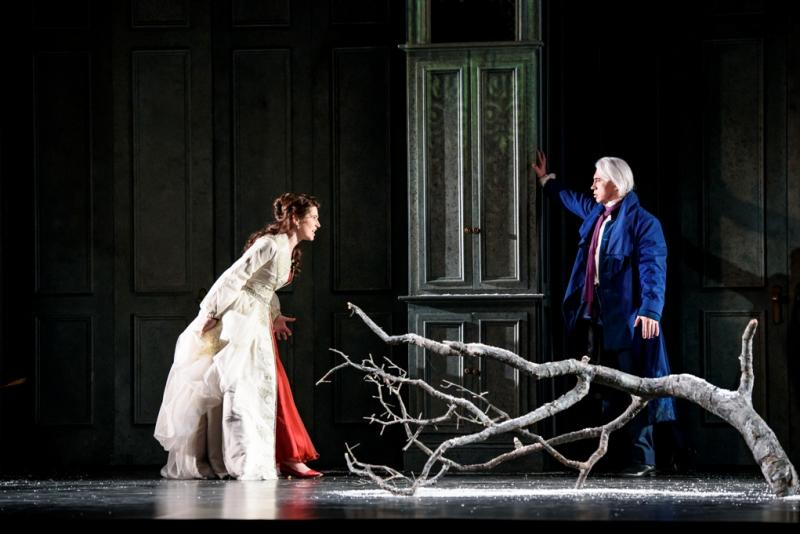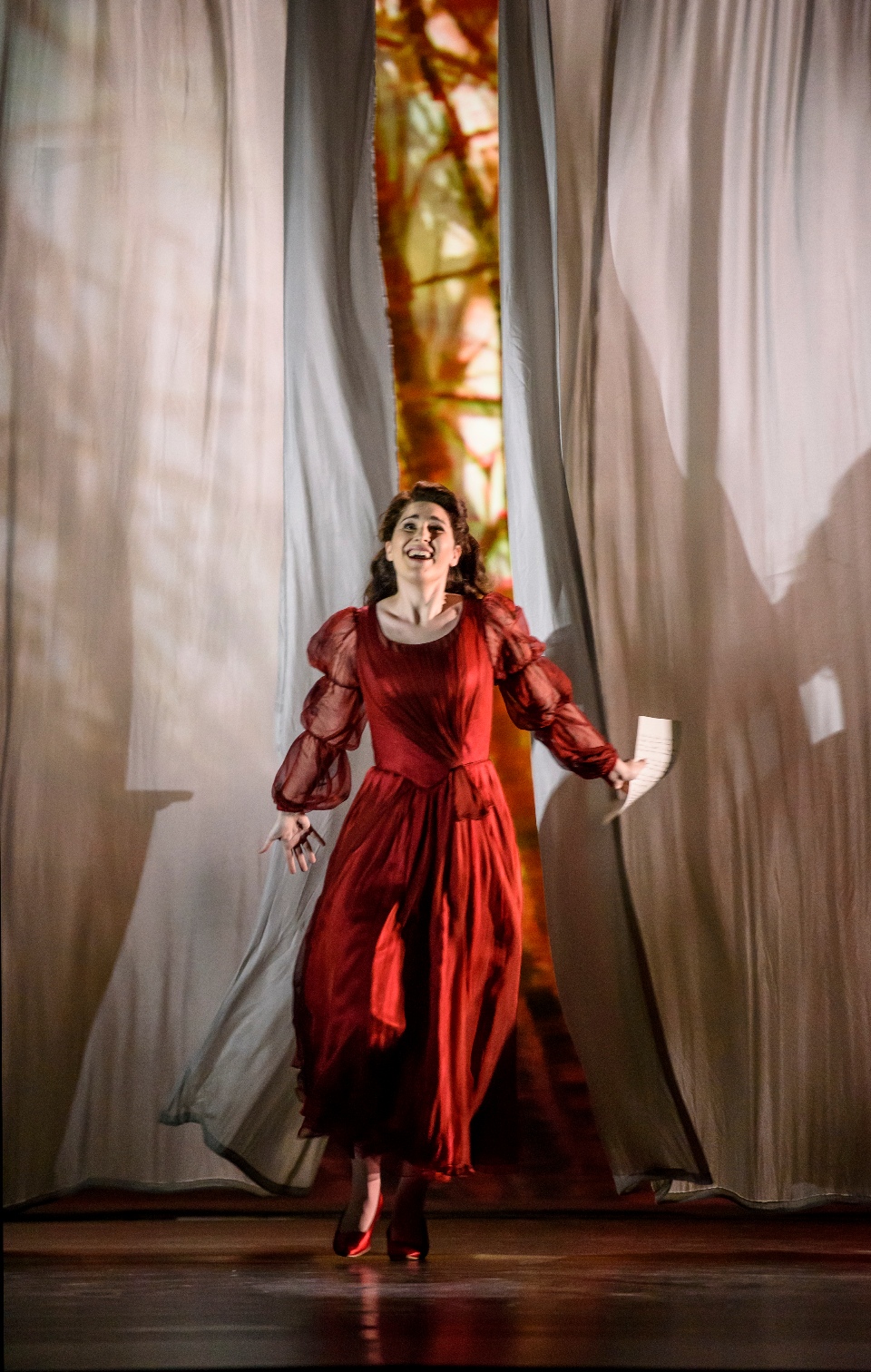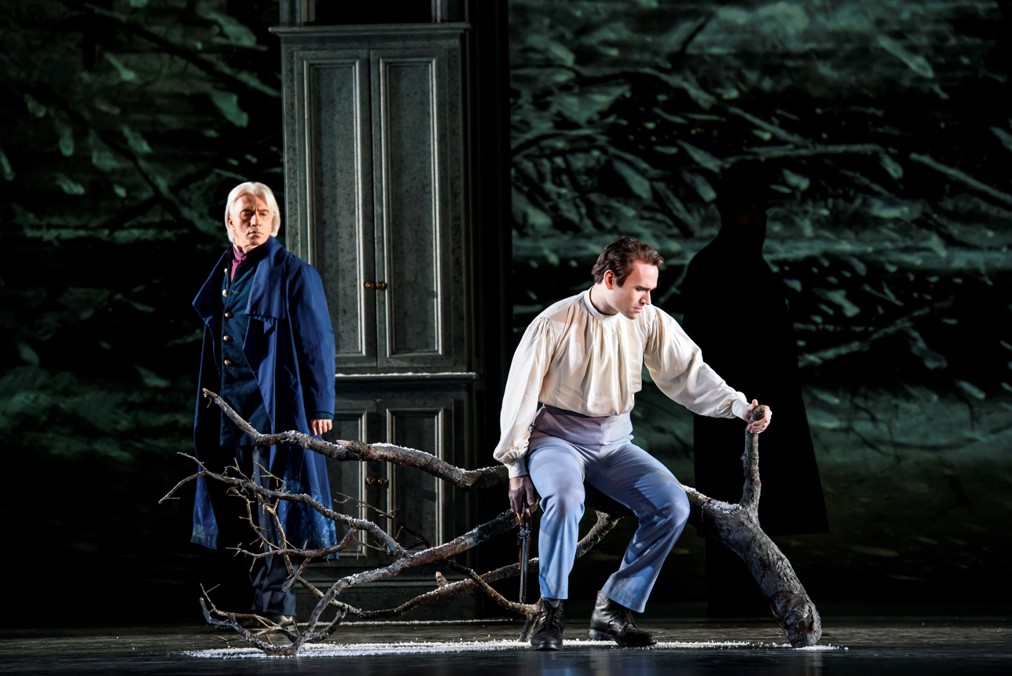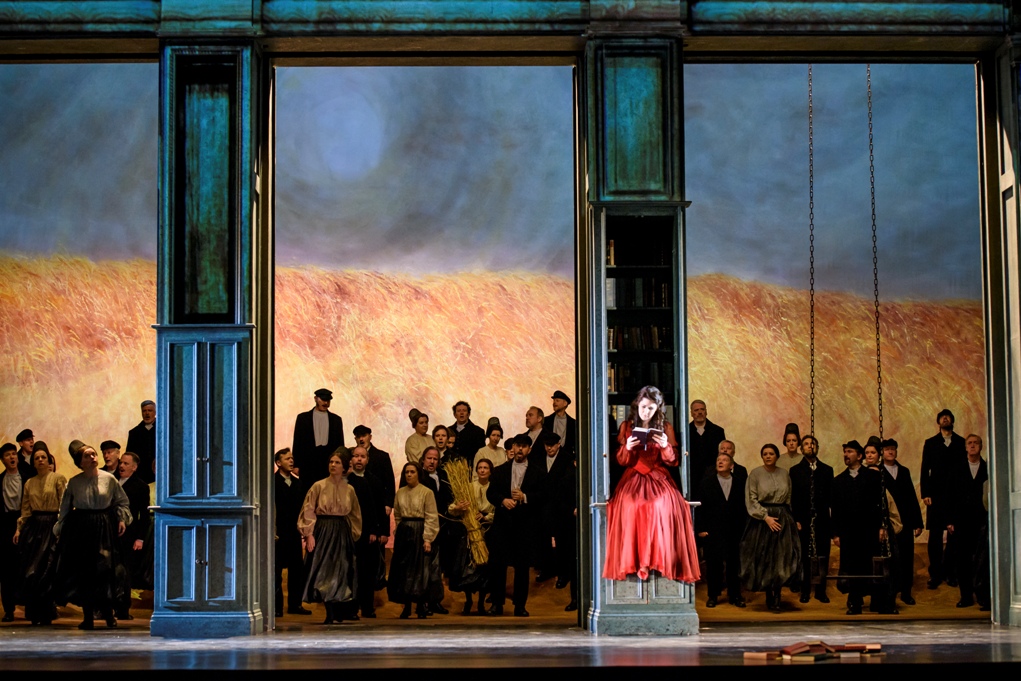Eugene Onegin, Royal Opera | reviews, news & interviews
Eugene Onegin, Royal Opera
Eugene Onegin, Royal Opera
Nicole Car lights up the stage as Tchaikovsky's Tatyana in a variable revival

Searing emotional truth has to be at the core of any attempt to stage Tchaikovsky’s “lyrical scenes after Pushkin”. I was among the minority who thought Kasper Holten got it right, with deep knowledge of the original verse-novel, in his first production as Covent Garden’s Director of Opera back in February 2013.
Australian soprano Nicole Car sang Tatyana when this production arrived in Sydney, and reports were ecstatic. As, indeed, is she in the early stages as the young girl whose infatuation with an enigmatic young dandy drives her to screeds of letter-writing passion before despair kicks in. Tchaikovsky’s Act One belongs to Tatyana, and thanks to the meaning and intensity with which Car (pictured below) manages to fill every phrase, the “meeting” of older if no wiser Tatyana with her teenage self (Emily Ranford) I find no less moving than before – vindicated, certainly, by the still centre of the Letter Scene as the woman who knows her fate holds the girl so full of bewilderment in a still embrace. Lucky those who could catch the facial expressions at closer quarters than the second row of the Balcony.
 Car, unusually, has the vocal heft and range as well as the looks to embrace Tatyana as impulsive girl and – in this production – desperate married woman. In the driven final scene, her darkish vocal timbre and dramatic skills remind me of Elisabeth Söderström in her prime. She rages convincingly against the Onegin who couldn’t make up his mind, who arrives too late at the realisation that he loves the girl he confusedly rejected. But it has to be an equal match, and dramatically it isn’t. Dmitri Hvorostovky came to personable life in Robert Carsen’s Met production but here he’s back to stiff persona and on-transmit vocals. The temperatures drop with each of his rejoinders towards the end. It’s still a fine, smoothish baritone sound, but no longer the Guarnerius cello phrasing the arioso of Onegin’s rejection so beautifully on the recording conducted by Semyon Bychkov over 23 years ago.
Car, unusually, has the vocal heft and range as well as the looks to embrace Tatyana as impulsive girl and – in this production – desperate married woman. In the driven final scene, her darkish vocal timbre and dramatic skills remind me of Elisabeth Söderström in her prime. She rages convincingly against the Onegin who couldn’t make up his mind, who arrives too late at the realisation that he loves the girl he confusedly rejected. But it has to be an equal match, and dramatically it isn’t. Dmitri Hvorostovky came to personable life in Robert Carsen’s Met production but here he’s back to stiff persona and on-transmit vocals. The temperatures drop with each of his rejoinders towards the end. It’s still a fine, smoothish baritone sound, but no longer the Guarnerius cello phrasing the arioso of Onegin’s rejection so beautifully on the recording conducted by Semyon Bychkov over 23 years ago.
Bychkov, as ever, is more about dark, earthy, doomy phrasing than the lightness and air which need to penetrate the melancholy of the drama’s early stages (and did, on this production’s first airing, under Robin Ticciati). He’s willing to support, which is ever so slightly to over-indulge, tenor Michael Fabiano (pictured below with Hvorostovsky), who initially fails to convince us of Lensky’s ardour and doesn’t pull out all the raging stops when the poet finds his friend flirting with his girl Olga (Oksana Volkova, perfect) at Tatyana’s name-day party: this confrontation can blaze, and – top note apart – it didn't last night.
 In purely vocal terms, though, the aria before the fatal duel is technical perfection and would win all accolades in concert performance. The sorrowing clarinet responses have all the air they need, and Bychkov makes the descending bass lines towards the end sound like the end of Tchaikovsky’s "Pathétique" Symphony – many years in the future at the time of Onegin’s composition – and projects the baleful trombones as tragedy looms very impressively.
In purely vocal terms, though, the aria before the fatal duel is technical perfection and would win all accolades in concert performance. The sorrowing clarinet responses have all the air they need, and Bychkov makes the descending bass lines towards the end sound like the end of Tchaikovsky’s "Pathétique" Symphony – many years in the future at the time of Onegin’s composition – and projects the baleful trombones as tragedy looms very impressively.
Ferruccio Furlanetto has licence to dramatise the presence of Tatyana’s general husband Prince Gremin, but the keenly-anticipated aria is disappointing: rough and flat. Not even basses keep their vocal sheen for ever, it seems. There are reliable cameos from Diana Montague’s elegant mother, Catherine Wyn-Rogers’ surprisingly authentic Nyanya, James Platt's unusually authoritative Zaretsky – could he be a future Gremin? – and Jean-Paul Fouchécourt, not allowed to make too much of Monsieur Triquet’s name-day homage. The chorus sounds appropriately full-bodied, though in this production, they don't move much, threatening black-and-white figures of convention against Onegin's deep blue and Tatyana's red (pictured below, strong input from Mia Stensgaard's set, Katrina Lindsay's costumes and Wolfgang Göbbel's lighting in the first scene).

Holten has tweaked the production: I think I’m right in saying that the more mannered dance element of the younger Onegin and Tatyana is minimised, and our heroine no longer stands in a cupboard to hide from the party catastrophe. For all its passing flaws, though, first time round was best – and you can catch it on a DVD which provides further focus. Watch it and if you like what you see go this time for Car, Lensky’s last aria and some of the orchestral detail. It might also be worth waiting for impressive young Polish baritone Artur Rucinski, who takes over the role of Onegin for the last two performances.
rating
Explore topics
Share this article
The future of Arts Journalism
You can stop theartsdesk.com closing!
We urgently need financing to survive. Our fundraising drive has thus far raised £49,000 but we need to reach £100,000 or we will be forced to close. Please contribute here: https://gofund.me/c3f6033d
And if you can forward this information to anyone who might assist, we’d be grateful.

Subscribe to theartsdesk.com
Thank you for continuing to read our work on theartsdesk.com. For unlimited access to every article in its entirety, including our archive of more than 15,000 pieces, we're asking for £5 per month or £40 per year. We feel it's a very good deal, and hope you do too.
To take a subscription now simply click here.
And if you're looking for that extra gift for a friend or family member, why not treat them to a theartsdesk.com gift subscription?
more Opera
 La bohème, Opera North review - still young at 32
Love and separation, ecstasy and heartbreak, in masterfully updated Puccini
La bohème, Opera North review - still young at 32
Love and separation, ecstasy and heartbreak, in masterfully updated Puccini
 Albert Herring, English National Opera review - a great comedy with depths fully realised
Britten’s delight was never made for the Coliseum, but it works on its first outing there
Albert Herring, English National Opera review - a great comedy with depths fully realised
Britten’s delight was never made for the Coliseum, but it works on its first outing there
 Carmen, English National Opera review - not quite dangerous
Hopes for Niamh O’Sullivan only partly fulfilled, though much good singing throughout
Carmen, English National Opera review - not quite dangerous
Hopes for Niamh O’Sullivan only partly fulfilled, though much good singing throughout
 Giustino, Linbury Theatre review - a stylish account of a slight opera
Gods, mortals and monsters do battle in Handel's charming drama
Giustino, Linbury Theatre review - a stylish account of a slight opera
Gods, mortals and monsters do battle in Handel's charming drama
 Susanna, Opera North review - hybrid staging of a Handel oratorio
Dance and signing complement outstanding singing in a story of virtue rewarded
Susanna, Opera North review - hybrid staging of a Handel oratorio
Dance and signing complement outstanding singing in a story of virtue rewarded
 Ariodante, Opéra Garnier, Paris review - a blast of Baroque beauty
A near-perfect night at the opera
Ariodante, Opéra Garnier, Paris review - a blast of Baroque beauty
A near-perfect night at the opera
 Cinderella/La Cenerentola, English National Opera review - the truth behind the tinsel
Appealing performances cut through hyperactive stagecraft
Cinderella/La Cenerentola, English National Opera review - the truth behind the tinsel
Appealing performances cut through hyperactive stagecraft
 Tosca, Royal Opera review - Ailyn Pérez steps in as the most vivid of divas
Jakub Hrůša’s multicoloured Puccini last night found a soprano to match
Tosca, Royal Opera review - Ailyn Pérez steps in as the most vivid of divas
Jakub Hrůša’s multicoloured Puccini last night found a soprano to match
 Tosca, Welsh National Opera review - a great company reduced to brilliance
The old warhorse made special by the basics
Tosca, Welsh National Opera review - a great company reduced to brilliance
The old warhorse made special by the basics
 BBC Proms: The Marriage of Figaro, Glyndebourne Festival review - merriment and menace
Strong Proms transfer for a robust and affecting show
BBC Proms: The Marriage of Figaro, Glyndebourne Festival review - merriment and menace
Strong Proms transfer for a robust and affecting show
 BBC Proms: Suor Angelica, LSO, Pappano review - earthly passion, heavenly grief
A Sister to remember blesses Puccini's convent tragedy
BBC Proms: Suor Angelica, LSO, Pappano review - earthly passion, heavenly grief
A Sister to remember blesses Puccini's convent tragedy
 Orpheus and Eurydice, Opera Queensland/SCO, Edinburgh International Festival 2025 review - dazzling, but distracting
Eye-popping acrobatics don’t always assist in Gluck’s quest for operatic truth
Orpheus and Eurydice, Opera Queensland/SCO, Edinburgh International Festival 2025 review - dazzling, but distracting
Eye-popping acrobatics don’t always assist in Gluck’s quest for operatic truth

Add comment